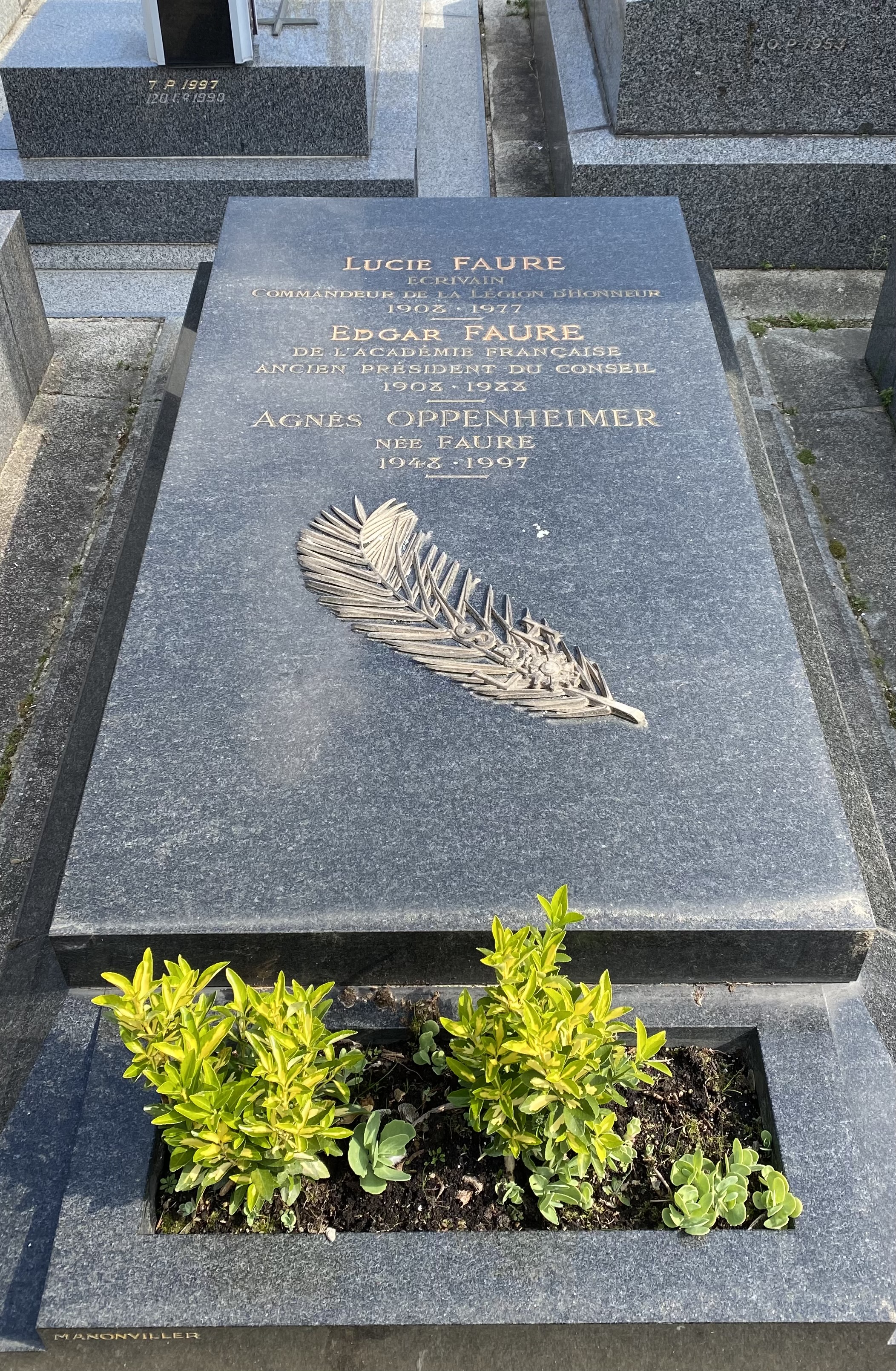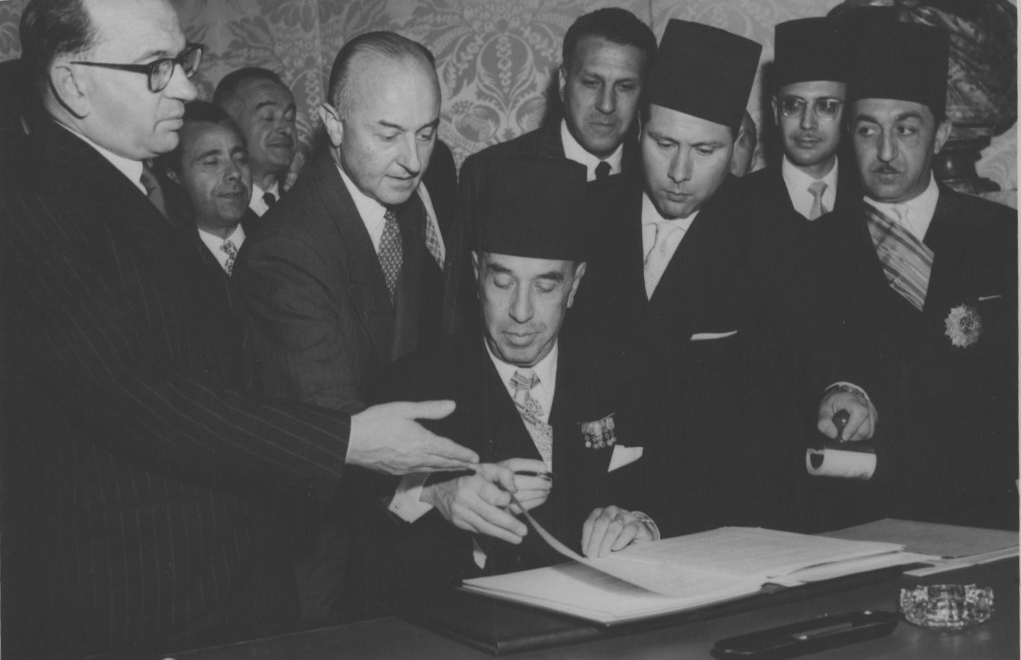1. Overview
Edgar Jean Faure (Edgar Faureɛdɡaʁ foʁFrench; 18 August 1908 - 30 March 1988) was a prominent French politician, lawyer, essayist, historian, and memoirist whose multifaceted career significantly impacted French politics and intellectual life throughout the mid-20th century. He served two terms as Prime Minister of France, first in 1952 and again from 1955 to 1956. Beyond his leadership roles, Faure held numerous ministerial positions across various governments, demonstrating his adaptability and influence. His extensive parliamentary career included service as a Member of the National Assembly and Senator, culminating in his presidency of the National Assembly from 1973 to 1978. Faure was also deeply involved in local government, serving as mayor and president of regional councils. Intellectually, he was a prolific writer, contributing to history, law, and philosophy, and was recognized for his intellectual prowess by being elected to the Académie Française in 1978.
2. Early Life and Education
Edgar Jean Faure was born on 18 August 1908, in Béziers, Hérault, a department within the Languedoc-Roussillon region of France. His father was a French Army doctor. Despite suffering from nearsightedness, Faure displayed exceptional academic brilliance from a young age. He achieved his baccalauréat at the remarkably early age of 15 and went on to earn a law degree in Paris by the age of 19. At 21, he was admitted to the bar association, becoming the youngest lawyer in France at that time. While residing in Paris, his intellectual curiosity and ambition led him to become actively involved in the political landscape of the French Third Republic. In 1929, he officially joined the Radical Party, marking the beginning of his long and distinguished political career.
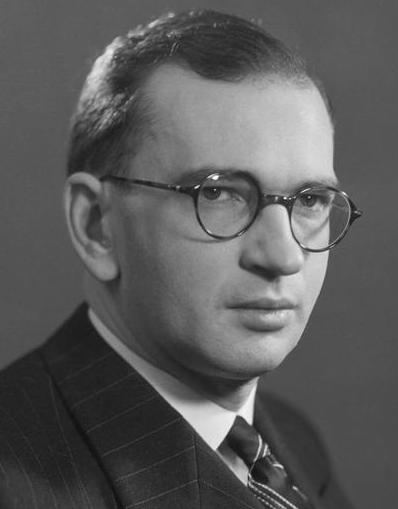
3. World War II and Resistance Activities
During World War II, as Nazi Germany occupied France, Edgar Faure actively joined the French Resistance, becoming a member of the Maquis. His commitment to liberating France led him to flee to Algiers in 1942, where he joined Charles de Gaulle's headquarters. There, he was appointed head of the legislative department within the Provisional Government of the Republic. Following the war, Faure played a significant role in the pursuit of justice for war crimes, serving as a French counsel for the prosecution at the historic Nuremberg Trials. His involvement in these critical events underscored his dedication during a pivotal period of global conflict.
4. Political Career
Edgar Faure's political career was marked by his consistent presence in various levels of French government, his leadership in the Radical Party, his two terms as Prime Minister, and his later ideological shifts.
4.1. Early Political Involvement
Faure's initial foray into politics began in Paris, where he joined the Radical Party in 1929, during the era of the French Third Republic. His intellectual acumen and legal background quickly established him within the party. In 1946, following World War II, he was elected to the National Assembly representing the Jura department as a Radical. During the French Fourth Republic, the political landscape was characterized by a multitude of parties, often leading to unstable coalition governments. Despite the Radical Party's declining popularity, which saw its vote share drop below 10%, its strategic position often granted it a disproportionately important role in forming governments. This context allowed Faure to rise rapidly through the ranks, accumulating significant ministerial experience and eventually leading the cabinet. He was considered a leader of the more conservative wing of the Radical Party, often opposing the party's left-leaning faction led by Pierre Mendès France.
4.2. Prime Minister of France
Edgar Faure served as Prime Minister of France (formally "President of the Council") on two occasions during the French Fourth Republic.
His first ministry ran from 20 January to 8 March 1952. In this government, Faure also held the portfolio of Minister of Finance. Key members of his cabinet included Georges Bidault as Vice President of the Council and Minister of National Defense, Henri Queuille as Vice President of the Council, and Robert Schuman as Minister of Foreign Affairs. Other notable appointments included Pierre Pflimlin for the Council of Europe, Maurice Bourgès-Maunoury for Armaments, and Charles Brune for the Interior. This short-lived government demonstrated the instability of the Fourth Republic's political system.
His second term as Prime Minister spanned from 23 February 1955 to 1 February 1956. During this period, Faure led a government that included Antoine Pinay as Minister of Foreign Affairs, Pierre Koenig as Minister of National Defense and Armed Forces, and Maurice Bourgès-Maunoury as Minister of the Interior. Pierre Pflimlin served as Minister of Finance and Economic Affairs. Significant changes occurred within this ministry; on 6 October 1955, Pierre Billotte succeeded Koenig as Minister of National Defense and Armed Forces, and Vincent Badie took over from Raymond Triboulet as Minister of Veterans and War Victims. On 20 October 1955, Pierre July left the cabinet, and the office of Minister of Moroccan and Tunisian Affairs was abolished. Later, on 1 December 1955, Faure himself took on the interim role of Minister of the Interior, succeeding Bourgès-Maunoury. During this second premiership, on 16 March 1955, Faure announced a plan for the manufacture of a hydrogen bomb, following the United Kingdom's lead, but this plan was withdrawn the following month due to criticism.
4.3. Ministerial Appointments
Beyond his two terms as Prime Minister, Edgar Faure held a wide array of ministerial portfolios throughout his career, contributing to various policy areas.
His early ministerial roles included:
- Secretary of State for Finance:** 1949-1950
- Minister of the Budget:** 1950-1951
- Minister of Justice:** 1951-1952
- Minister of Finance and Economic Affairs:** 1953-1955
- Minister of Foreign Affairs:** January-February 1955
- Minister of Finance, Economic Affairs and Planning:** May-June 1958
Under the French Fifth Republic, Faure continued to serve in significant cabinet positions:
- Minister of Agriculture:** 1966-1968
- Minister of National Education:** 1968-1969
- Minister of State, Minister of Social Affairs:** 1972-1973
As Minister of National Education, Faure was instrumental in pushing through a significant reform of the universities following the May 1968 student protests. He also chaired the UNESCO International Commission on the Development of Education, which published the influential "Learning To Be" report in 1970, advocating for lifelong learning.
4.4. Parliamentary and Local Government Service
Faure's dedication to public service extended to extensive parliamentary and local government roles. He served as a Member of the National Assembly for the Jura department from 1946 to 1958. Later, he represented the Doubs department in the National Assembly from 1967 to 1980, though he remained a cabinet member for parts of this period. From 1973 to 1978, he held the prestigious position of President of the National Assembly, presiding over the lower house of the French Parliament. He sought another term as President in 1978 but was defeated by Jacques Chaban-Delmas.
In addition to his National Assembly service, Faure was a Senator for Jura from 1959 to 1966 (becoming a cabinet member in 1966) and again for Doubs from 1980 until his death in 1988.
At the regional and local levels, Faure held numerous leadership positions:
- Mayor of Port-Lesney**, Jura: 1947-1970 and 1983-1988
- Mayor of Pontarlier**: 1971-1977
- President of the General Council of Jura**: 1949-1967
- Member of the General Council of Doubs**: 1967-1979
- President of the Regional Council of Franche-Comté**: 1974-1981 and 1982-1988
He also played a crucial role in the establishment and early years of the Assembly of European Regions (AER), serving as its first president from 1985 until his death in 1988.
4.5. Political Evolution and Affiliations
Edgar Faure's political journey was marked by notable ideological shifts, leading to him being nicknamed "weathercock" by some critics. Initially a member of the Radical Party during the French Third Republic and French Fourth Republic, he belonged to the party's conservative wing, often at odds with figures like Pierre Mendès France.
His views evolved significantly during the Fourth Republic. While he initially opposed the establishment of the French Fifth Republic and voted against the presidential election by universal suffrage in the 1962 referendum, he eventually became a Gaullist. He joined the Union for the New Republic, the Gaullist party, which sent him on an unofficial mission to the People's Republic of China in 1963. This shift was perceived by some as a careerist move.
In response to the "weathercock" nickname, Faure famously replied with humor, "it is not the weathercock which turns; it is the wind!" This statement reflected his pragmatic approach to politics, adapting to changing political currents rather than adhering rigidly to a single ideology. In the 1974 French presidential election, he declined to be a candidate and instead supported Valéry Giscard d'Estaing against the Gaullist candidate, Jacques Chaban-Delmas, further illustrating his independent political trajectory and willingness to align with different factions based on his assessment of the political landscape. His affiliations ultimately included the Radical Party, the Union for Democratic Labor, the Union for French Democracy, and the Rally for the Republic.
5. Writings and Academic Contributions
Edgar Faure was a prolific writer and intellectual, whose published works spanned various genres including essays, historical analyses, legal studies, and memoirs. His contributions reflected his deep engagement with both political theory and historical inquiry.
His extensive bibliography includes:
- Pascal: le procès des provinciales, Firmin Didot, 1930
- Le pétrole dans la paix et dans la guerre, Nouvelle revue critique, 1938
- Pour rencontrer M. Marshes, Sequana Éditeur, 1942 (detective novel under the pseudonym Ed Faure)
- L'installation du président Fitz Mole, Sequana Éditeur (detective novel under the pseudonym Ed Faure)
- Mr Langois n'est pas toujours égal à lui-même, Julliard, 1950 (novel under the pseudonym Edgar Sanday)
- Le serpent et la tortue (les problèmes de la Chine populaire), Juillard, 1957
- La disgrâce de Turgot, Gallimard, 1961
- La capitation de Dioclétien, Sirey, 1961 (doctoral thesis in law)
- Prévoir le présent, Gallimard, 1966
- L'éducation nationale et la participation, Plon, 1968
- Philosophie d'une réforme, Plon, 1969
- L'âme du combat, Fayard, 1969
- Ce que je crois, Grasset, 1971
- Pour un nouveau contrat social, Seuil, 1973
- Au-delà du dialogue avec Philippe Sollers, Balland, 1977
- La banqueroute de Law, Gallimard, 1977
- La philosophie de Karl Popper et la société politique d'ouverture, Firmin Didot, 1981
- Mémoires I, "Avoir toujours raison, c'est un grand tort", Plon, 1982
- Mémoires II, "Si tel doit être mon destin ce soir", Plon, 1984 (awarded the 9th Pierre-Lafue Foundation Prize in 1985)
- Discours prononcé pour la réception de Senghor à l'Académie française, 29 March 1984
His work La disgrâce de Turgot was translated into Japanese as チュルゴーの失脚 1776年5月12日のドラマ (The Fall of Turgot: The Drama of May 12, 1776).
6. International Engagement
Edgar Faure was actively involved in international affairs, extending his influence beyond French domestic politics. In 1963, as a representative of the Gaullist party, the Union for the New Republic, he undertook an unofficial mission to the People's Republic of China. This visit was significant given the geopolitical context of the time.
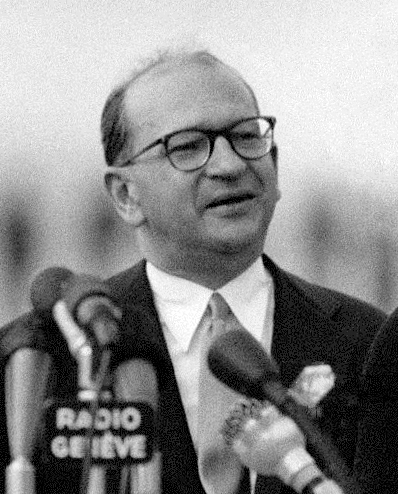
He was also a notable signatory to the agreement to convene a convention for drafting a world constitution. This initiative led to the first-ever World Constituent Assembly, which aimed to draft and adopt a Constitution for the Federation of Earth. This demonstrates his engagement with global governance and peace initiatives.
From 1966 to 1968, Faure participated in an OECD education survey mission, including a visit to Japan. The survey team, which included Edwin O. Reischauer, produced a report on "Japan's Educational Policy." While acknowledging the significant contribution of Japanese education to the country's rapid economic growth and commending its primary education system, the report also highlighted challenges. These included the rigidity and hierarchical nature of higher education, particularly universities, and emphasized the necessity of internationalizing education.
Furthermore, Faure played a key role in the creation and early development of the Assembly of European Regions (AER). He served as its first president from 1985 until his death in 1988, contributing to the strengthening of regional cooperation across Europe.
7. Thought, Philosophy, and Public Perception
Edgar Faure's political ideology and intellectual approach to governance were characterized by pragmatism and a capacity for adaptation, which also shaped his public image. His shifting political affiliations, from the Radical Party to Gaullism and later supporting Valéry Giscard d'Estaing, earned him the nickname "weathercock" (girouetteFrench). This moniker suggested a careerist who changed allegiances with the political winds. However, Faure, known for his humor, famously countered this criticism by stating, "it is not the weathercock which turns; it is the wind!" This response highlighted his belief that his changes in affiliation were a rational response to evolving political circumstances rather than a lack of conviction.
Intellectually, Faure was a deep thinker, as evidenced by his extensive writings on history, law, and philosophy. His work as Minister of National Education, particularly his role in the 1968 university reforms, showcased his progressive approach to social policy and his commitment to modernizing educational institutions. His chairmanship of the UNESCO International Commission on the Development of Education and the resulting "Learning To Be" report further demonstrated his forward-thinking views on education, emphasizing the importance of lifelong learning and adapting education to future needs. His election to the Académie Française in 1978 solidified his reputation as a significant intellectual figure in France, recognized for his contributions to literature and thought.
8. Personal Life
In 1931, Edgar Faure married Lucie Meyer, a notable writer and the daughter of a silk merchant. Their honeymoon, lasting one month, was spent in the Soviet Union. Lucie Faure was a significant intellectual figure in her own right, and their marriage connected two prominent figures in French public life.
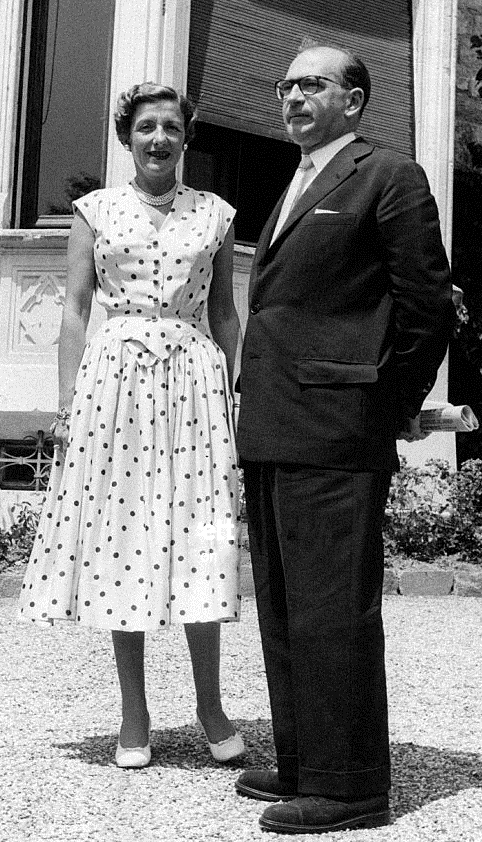
9. Death and Legacy
Edgar Faure passed away on 30 March 1988, in Paris, France, at the age of 79. He is interred alongside his wife, Lucie Faure, in the Passy Cemetery in Paris.
His enduring legacy is multifaceted. His election to the Académie Française in 1978, occupying the 15th seat, cemented his place among France's most distinguished intellectuals. Faure's political career, marked by his two terms as Prime Minister and numerous ministerial roles, demonstrated his capacity for leadership and his ability to navigate the complex political landscape of both the French Fourth Republic and the French Fifth Republic. His instrumental role in the 1968 university reforms is particularly remembered for its impact on French higher education. Beyond national politics, his international engagements, such as his mission to China, his involvement in the world constitution movement, and his leadership in the Assembly of European Regions, underscore his contributions to global policy and cooperation. Edgar Faure is remembered as a shrewd and adaptable politician, a profound intellectual, and a significant figure whose actions left a lasting influence on French politics and intellectual discourse.
